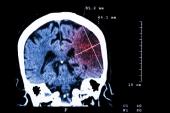Ablation May Beat Drugs for Reducing Dementia Risk in AF Patients
This is confirmatory of prior studies showing maintenance of sinus rhythm with ablation lowers dementia risk, one expert says.

SAN FRANCISCO, CA—Among patients with atrial fibrillation (AF), the long-term risk of dementia is lower among those who undergo catheter ablation rather than receiving antiarrhythmic drugs (AADs) alone, a large observational study suggests.
Dementia risk was about 40% lower in the ablation group (HR 0.59; 95% CI 0.52-0.67), a finding consistent in both men and women and among patients treated in the most-recent time period, Emily Zeitler, MD (Dartmouth Hitchcock Medical Center, Lebanon, NH), reported here at Heart Rhythm 2022.
One of the session's moderators, Prash Sanders, MBBS, PhD (University of Adelaide and Royal Adelaide Hospital, Australia), noted that “there’s a signal, definitely, that AF is associated with dementia, and we have had signals previously that maintaining sinus rhythm with ablation does reduce the risk of dementia. So I think this is confirmatory data of that in a large-scale population.”
Indeed, the relationship between AF and dementia has long been recognized, although the underlying mechanisms are not completely understood and clearly multifactorial, Zeitler said, adding that damage from repeated microembolic and microhemorrhagic events are not enough to explain it.
Although there are no randomized trials that have evaluated the impact of different rhythm control strategies on the risk of dementia in AF, there is mounting observational evidence that keeping patients in sinus rhythm may reduce the risk of dementia, Zeitler said. “If that’s true, and if that’s somehow related to the atrial fibrillation itself or the suppression of atrial fibrillation itself,” she said, “then it stands to reason that catheter ablation might do a better job at reducing the risk of dementia as a component of A-fib treatment.”
To explore that possibility, she and her colleagues turned to the Optum Clinformatics Data Mart, a repository of claims data from patients with private insurance, including Medicare Advantage. After exclusion of individuals younger than 18, those with less than 12 months of continuous plan enrollment, and those with a dementia diagnosis or a history of various cardiovascular procedures, the analysis included 38,176 propensity-matched patients (mean age 65 years; 36% women)—half in the ablation group and half in the AAD group—with claims spanning from May 2000 to March 2021. Mean CHA2DS2-VASc score was 2.91, and 77% were on oral anticoagulation.
Patients in the AAD group had filled prescriptions for at least two different AADs and had at least one clinical visit with a primary diagnosis of AF in the past year. To reflect current guidelines regarding use of catheter ablation, which state that ablation should be used after a failure of AADs in most patients, individuals in that group had to have a claim for an ablation procedure plus a filled prescription for an AAD at least 30 days prior to the procedure.
The primary outcome was a diagnosis of dementia, with death as a competing risk. Ablation was associated with a lower risk in the overall cohort and among those treated in the second half of the study period (HR 0.59; 95% CI 0.51-0.68), which reflects contemporary protocols, techniques, and tools for ablation and AAD therapy, Zeitler said.
The researchers performed an analysis broken down by patient sex, as well, with the recognition that women have a greater lifelong risk of dementia and are older at the time of AF diagnosis compared with men. Ablation was associated with a lower risk of dementia in both women (HR 0.60; 95% CI 0.50-0.72) and men (HR 0.55; 95% CI 0.46-0.66).
To assess the risk of residual confounding, the investigators did a falsification analysis looking at the relationship between ablation and risks of shingles, multiple sclerosis, and ulcerative colitis. No significant associations were found, indicating limited residual confounding in the main analysis, Zeitler said.
After her presentation, Zeitler was asked about whether ablation is protecting the brain over the long run despite the fact that the procedure itself can cause emboli to travel to the brain.
In response, Zeitler said she’d be cautious about inferring causation: “I think it highlights the complexity of the relationship between dementia and atrial fibrillation. It really is not adequately explained by microemboli or microhemorrhages either from the disease itself or the therapies that we prescribe for A-fib.”
There are potential hemodynamic explanations for the interplay between dementia and AF, she noted, pointing to the possibility that suppression of AF could have a beneficial impact on cerebrovascular blood flow that might counterbalance any potential harm from the procedure.
To TCTMD, Sanders stressed that claims-based studies like this one are limited in the amount of information available in the database. In this case, he said, there’s little information on the occurrence of stroke, which would have an effect on the occurrence of dementia. “There’s a lot of contributors to neural injury that we need to account for,” he said.
Still, there is enough evidence to support discussion of the potential reduction in dementia with patients when counseling them about ablation, and that’s already happening, Sanders said. “We don’t have a randomized controlled study yet, so we don’t present it as level-one data when we discuss it with a patient, but we do present it as one of the potential benefits of catheter ablation.”
Todd Neale is the Associate News Editor for TCTMD and a Senior Medical Journalist. He got his start in journalism at …
Read Full BioSources
Zeitler E. Risk of dementia among patients with atrial fibrillation treated with catheter ablation versus antiarrhythmic drugs. Presented at: HRS 2022. April 30, 2022. San Francisco, CA.
Disclosures
- The analysis was funded by Biosense Webster, and several co-authors are employees of the company.
- Zeitler reports consulting for Biosense Webster and Arena Pharmaceuticals (now Pfizer); receiving speaking and travel support from Medtronic; and receiving research support from Boston Scientific, Sanofi, and Biosense Webster.
- Sanders reports honoraria or speaking/consulting fees from Medtronic, Abbott, and Boston Scientific; and research grants from Boston Scientific, Abbott, Medtronic, CathRx, Pacemate, MicroPort CRM, Becton Dickinson, and EBR Systems.




Julio Guerrero